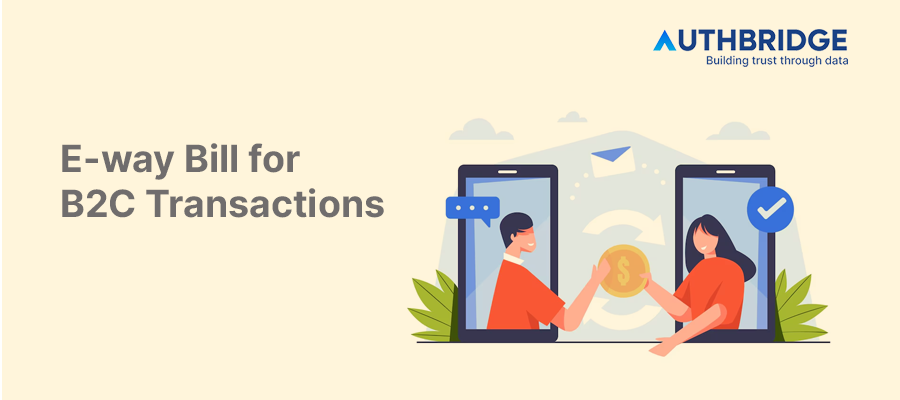Requirements, Penalties & Best Practices

The E-way Bill is a mandatory electronic document for the movement of goods valued over Rs 50,000, applicable under the GST regime. In B2C (Business to Consumer) transactions, it serves to document the movement of goods from a business to the end consumer, ensuring compliance with tax laws and facilitating the smooth transit of goods.
Key Differences Between B2B and B2C E-way Bills
While both B2B (Business to Business) and B2C transactions require E-way Bills under certain conditions, B2C E-way Bills are typically not accompanied by the same level of detailed information about the recipient, given the end consumer's non-registration under GST.
E-Invoicing and QR Code Requirements in B2C Transactions
Overview of E-Invoicing in B2C
E-Invoicing, mandatory for specified categories of businesses, primarily focuses on B2B transactions. However, specific provisions and pilot projects have explored its applicability to B2C transactions, aiming to enhance tax compliance and streamline the invoicing process.
Mandatory QR Code Implementation
For B2C transactions, businesses subject to e-invoicing requirements must generate invoices with a dynamic QR code. This QR code facilitates digital payments and allows consumers to verify the details of their purchase, enhancing transparency and compliance.
Generating E-way Bills for B2C Transactions
When is E-way Bill Required for B2C?
E-way Bills are required for B2C transactions when the value of goods being transported exceeds Rs 50,000, and the goods move either inter-state or intra-state under specific conditions set by the respective state's GST regulations.
Step-by-Step Process for Generation
- Login to the E-way Bill Portal: Access your account on the official E-way Bill portal.
- Enter Details: Fill in the required details, including the transaction type (B2C), product details, and transportation information.
- Generate E-way Bill: Submit the details to generate the E-way Bill, obtaining a unique E-way Bill Number (EBN).
Compliance and Regulatory Requirements
Legal Framework and Compliance for B2C E-way Bills
The GST Council outlines the legal framework for E-way Bills, specifying the conditions under which they are required for B2C transactions. Compliance with these regulations is crucial to avoid penalties.
Penalties for Non-Compliance
Failure to generate an E-way Bill for eligible B2C transactions can result in penalties, including fines and the potential seizure of goods.
Legal Framework and Compliance for B2C E-way Bills
The GST legislation mandates the generation of E-way Bills for the transportation of goods exceeding Rs 50,000 in value. For B2C transactions, this requirement ensures that goods delivered directly to consumers are accounted for, promoting transparency and compliance within the retail sector.
Penalties for Non-Compliance
Non-compliance with E-way Bill regulations can lead to significant penalties for businesses. These penalties may include fines, seizure of goods, and legal actions, emphasizing the importance of adhering to E-way Bill requirements.
Technological Solutions for E-way Bill Generation
Software and Tools for Simplifying E-way Bill Generation
Several GST software solutions and tools are available to simplify the process of E-way Bill generation for B2C transactions. These tools often offer features such as bulk generation, integration with accounting software, and real-time tracking of E-way Bills.
Integration of E-Invoicing and E-way Bill Systems
For businesses subject to e-invoicing requirements, integrating e-invoicing with E-way Bill generation can streamline operations. This integration allows for the automatic creation of E-way Bills for eligible B2C transactions, reducing manual data entry and minimizing errors.
Case Studies and Practical Examples
Real-World Applications of E-way Bills in B2C
Case studies of retail businesses and e-commerce platforms demonstrate the practical application of E-way Bills in B2C transactions. These examples highlight how businesses navigate compliance challenges, especially during high-volume sales periods or when dealing with high-value goods.
Lessons Learned and Best Practices
Best practices derived from these case studies include:
- Regularly updating software solutions to comply with the latest GST regulations.
- Training staff on E-way Bill generation and compliance requirements.
- Establishing protocols for the quick resolution of discrepancies in E-way Bills.
FAQs and Troubleshooting
Common Questions About B2C E-way Bills
- Q: Is an E-way Bill required for every B2C transaction?
- A: No, E-way Bills are only required for B2C transactions where the value of goods exceeds Rs 50,000.
- Q: Can E-way Bills be generated after the transportation of goods has started?
- A: No, E-way Bills should be generated before the commencement of goods transportation.
Solutions to Typical Challenges
- Challenge: Difficulty in managing high volumes of E-way Bills for B2C transactions.
- Solution: Utilize software that offers bulk generation and management of E-way Bills, ensuring efficient handling of large transaction volumes.
Conclusion
Navigating the E-way Bill requirements for B2C transactions is crucial for businesses to ensure compliance with GST regulations. By leveraging technology, adhering to best practices, and staying informed about legal requirements, businesses can effectively manage E-way Bills, avoiding penalties and facilitating smooth operations. As the GST framework continues to evolve, staying proactive and prepared will be key to successfully navigating E-way Bill compliance in the B2C sector.
For businesses looking to enhance their compliance processes, especially in managing E-way Bills for B2C transactions, adopting integrated software solutions and staying updated with regulatory changes are essential strategies. Embracing technology and best practices will not only ensure compliance but also contribute to more efficient and transparent operations.
Category

Abhinandan Banerjee
(Associate Manager - Marketing)
Abhinandan is a dynamic Product and Content Marketer, boasting over seven years of experience in crafting impactful marketing strategies across diverse environments. Known for his strategic insights, he propels digital growth and boosts brand visibility by transforming complex ideas into compelling content that inspires action.



